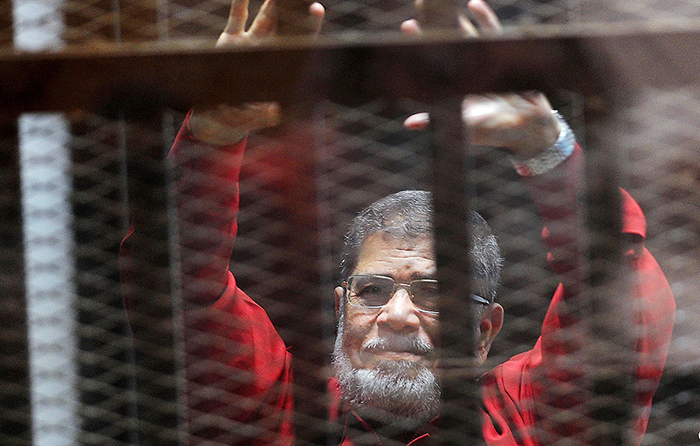



 Eric Walberg
Eric WalbergMuhammad Mursi (1951–2019) was the fifth President of Egypt (June 30, 2012–July 3, 2013), deposed by General ‘Abd al-Fattah al-Sisi in a coup d’état barely a year after he was elected to office. In his last words, Mursi accused the regime of “assassinating” him through years of poor prison conditions and deliberate withholding of medication or even checkups by a doctor despite his failing health (he suffered from high blood pressure and was diabetic, a deadly combination that can result in premature death if not treated in a timely manner).
Mursi is survived by his wife Najlah ‘Ali Mahmud (not “First Lady” but rather “First Servant of the Egyptian people”). Mursi had five children, two are US citizens born in California. His body was quickly buried, without an inquest and with only close family members present, but not his wife. His wish that he be buried in his hometown Adwa was denied.
Human Rights Watch Director for the Middle East Sarah Leah Whitson said Mursi’s treatment in prison was “horrific, and those responsible should be investigated and appropriately prosecuted.” The United Na-tions High Commissioner for Human Rights, called for a “prompt, impartial, thorough, and transparent investigation” into Mursi’s death.
Among major world leaders only Turkey, Jordan, Iran, Malaysia, and Qatar expressed regret at his death. Turkish President Recep Tayip Erdogan said, “Mursi did not die a natural death. He was killed. Turkey will do whatever it takes to prosecute Egypt in international courts.”
Mursi’s legacy is mixed. An engineer who studied at the University of Southern California, he was an unlikely figure to be thrust onto Egypt’s central stage, not a major thinker in the Muslim Brotherhood (MB), without any political experience. He was an unconvincing second choice for the MB as presidential candidate, a poor speaker, but brave and principled.
The charismatic, millionaire businessman Khayratal-Shatir, a major financier and chief strategist of the Brotherhood, was disqualified at the last minute based on previous trumped-up convictions, and Mursi was only allowed to register a few hours before the deadline. He was vilified by hysterical secular westernizers, and undermined by a campaign of lawlessness and planned shortages, but was popular to the end among devout Muslims. The media and the elite were against him and drowned out the Muslim wisdom not to overthrow a ruler as long as you are “not commanded to disobey Allah. If he is commanded to disobey, then there is no listening or obedience” (narrated by ‘Abdullah ibn ‘Umar and recorded by al-Bukhari, #2796).
The MB, like Iran’s Islamic order, doesn’t fit into Western secular thinking. The MB supported the mujahidin in Afghanistan, but they are not the Taliban. They never supported al-Qaeda. They are more in line with Turkey’s Islamically inclined AKP or perhaps even Iran’s Islamic government somewhat.
Here are a few key moments in Mursi’s presidency:
Like Erdogan in Turkey, in the heady days after the 2011 uprisings in the Arab world, Mursi got swept up in Islamic revolutionary fever, calling for overthrow of the (‘Alawi) “infidels,” a kind of belated revenge for the slaughter of the Syrian MB by Hafiz al-Asad in 1981. But then, just about everyone was (and still is) supporting the Syrian opposition, from Obama to most Sunnis, soon-to-be-ISIS, and leftists.
The last straw for the military was when Mursi attended an Islamist rally on June 15, 2013, where Salafi clerics called for jihad in Syria and denounced supporters of Bashar al-Asad as infidels. Mursi announced that his government had expelled Syria’s ambassador and closed the Syrian embassy in Cairo, calling for international intervention on behalf of the opposition forces and establishment of a no-fly zone.
Mursi’s attendance at the rally was later revealed to be a major factor in the army’s decision to side with anti-Mursi protesters during the June 30 anti-government protests. In November 2012, the National Salvation Front (NSF) had suddenly appeared, and overnight 22 million Egyptians signed a nationwide petition calling for Mursi’s immediate resignation.

Is it possible that Mursi might have survived if he hadn’t broken relations with Syria and called for jihad? The Egyptian military looked at Syria and saw their own future. The Syrian army was battling to hold the country together in the face of a dubious coalition of Islamists with lots of support from Saudi Arabia and the US. They decided they had to overthrow their own Brotherhood-led government before it took them on and ended their privileged hegemony. The Egyptian military is trained and equipped by the US. Egypt runs on Saudi dollars. Best to keep the US and Saudis on your side and the message by then was “Dump the Brotherhood.”
We will never know, but the plan from the start clearly was for the all-powerful military to give the Brotherhood some rope, and then take charge and hang them (metaphorically and literally) if they actually tried to govern, counting on the vengefulness of the old guard and the screaming liberals if the MB pushed too hard. The liberals were weak, and could be conned into supporting a coup, and then easily brought to heel with a few arrests and massacres.
This power politics is not confined to the Arab world. Iran and Venezuela are both targets of Western-backed campaigns to destroy any attempt, Islamic or socialist, to escape the clutches of the US empire. Donald Trump welcomed al-Sisi to the White House in April 2019, after the Egyptian pharaoh declared himself president for life (in a referendum that he won with 88.3% approval). Trump said, “We’ve never had a better relationship, Egypt and the United States, than we do right now. I think he’s doing a great job.” After the meeting, Trump pushed for the US to designate the Brotherhood as a terrorist organization.
Just as Erdogan came to regret his betrayal of al-Asad (and barely survived a coup in July 2016), so Mursi and the entire MB can only regret flirting with militant jihad abroad, from the 1980s on. Even if al-Asad is an ‘Alawi and you don’t approve of that sect of Islam, you don’t overthrow him as long as he doesn’t command you “to disobey Allah.”
But then, 30 years ago it was official Egyptian and US policy to encourage Islamists from Egypt to go and fight in Afghanistan. And the campaign against al-Asad was/is almost unanimous in the West. So again, I sympathize with bad judgment by the MB.
MB spokesman Dr. ‘Abd al-Mawjud al-Dardiri said, “The nation elected Mursi to a four-year term and should stand by that. To do otherwise would disrupt the country’s nascent democracy. It is not fair to a democracy.” Lesson from Iran and Syria: if you’re going to have an Islamic revolution, make sure the people and army are on your side.
Al-Sisi clearly models himself on Egypt’s 19th-century dictator-pasha Muhammad ‘Ali. The parallel is stark between al-Sisi’s and Muhammad ‘Ali’s clever invitation to all his Mamluk rivals to his citadel in 1811. He invited them to the centre of power and proceeded to slaughter a thousand of them to consolidate his rule. Invite your foes into the open and then murder them.
A legend of the pasha was that he had 300,000 street children rounded up and shipped to Aswan where they were taught skills and became assets to his construction of a new Egypt. Al-Sisi launched just such a program “Homeless Children” in May 2017, planning to gather up street waifs and whisk them to an army camp for training.
Then there’s the new Aswan Dam, criticized as a white elephant, even as Egypt hovers on the brink of bankruptcy (along with it is a scaled-down version of the MB’s proposed industrial corridor along the Nile). This nostalgia for the past is perhaps an attempt at taking the wind out of the sails of ISIS, the actual terrorists masquerading as Muslims, yearning for the caliphate, but is just as misguided.
By attempting to destroy the MB, the legitimate Islamic movement, al-Sisi gives fuel to the ISIS fires. That was what the MB could have tackled, not a secular dictator persecuting devout Muslims. On the contrary, terrorism has increased dramatically since 2013, with at least 500 deaths.
The Ministry of Education has decreed that the revolution of January 25, 2011, and the uprising on June 30, 2013 will no longer be mentioned in high school history textbooks. The “Arab Spring” didn’t happen. President Mursi is dead, assassinated. Al-Shatir and other MB leaders are on death row. Al-Sisi is dictator for life.
The end of history? Hardly. As for Mursi, he enters the realm of legend, a kind of foil for Usamah bin Ladin, as a true martyr to Islam.
